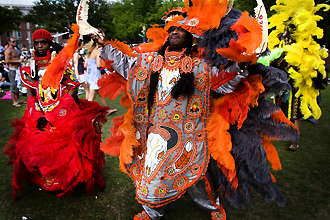Mardi Gras Indians Find Support at Tulane
![]() Ashlye Keaton, an adjunct professor of law at Tulane and local entertainment attorney, is the force behind an effort this year to assist Mardi Gras Indians in filing for copyright protection for their intricately made suits. Costumes and other apparel cannot be registered for such protection under law, but Keaton found a way around this by classifying the suits as works of art.
Ashlye Keaton, an adjunct professor of law at Tulane and local entertainment attorney, is the force behind an effort this year to assist Mardi Gras Indians in filing for copyright protection for their intricately made suits. Costumes and other apparel cannot be registered for such protection under law, but Keaton found a way around this by classifying the suits as works of art.

The intricately beaded costumes of Mardi Gras Indians typically feature large, boldly colored feathers in homage to the American Indians who provided assistance to those trying to escape slavery. (Photo by Ryan Rivet)
Prior to this breakthrough, many Mardi Gras Indians felt helpless in gaining compensation from commercial photography featuring their suits. Each costume can take a full year to complete.
“It's a visual art and it's a sculpture that happens to be displayed on a person,” says Keaton. “Registering a Mardi Gras Indian suit affords the owner remedies and solidifies a presumption of ownership.”
Tulane law students participating in the Entertainment Law Legal Assistance (ELLA) project are taking part in getting Indian suits registered. Keaton, the supervising attorney to ELLA, says the students have been instrumental in working with Mardi Gras Indians seeking help.
“I have students who are out meeting with the Indians to get photos of their suits taken,” says Keaton. “Registering is not a difficult process, but you need to have photographs to accompany the registration, and many people just don't have access to digital cameras.”
Through the ELLA project, Tulane law students have provided more than 10,000 hours of free, personalized legal assistance to local, low-income artists since 2005. More than 650 clients have been served, says Keaton.
ELLA is a partnership between the Tulane Law School, the Arts Council of New Orleans and Tipitina's Foundation.
